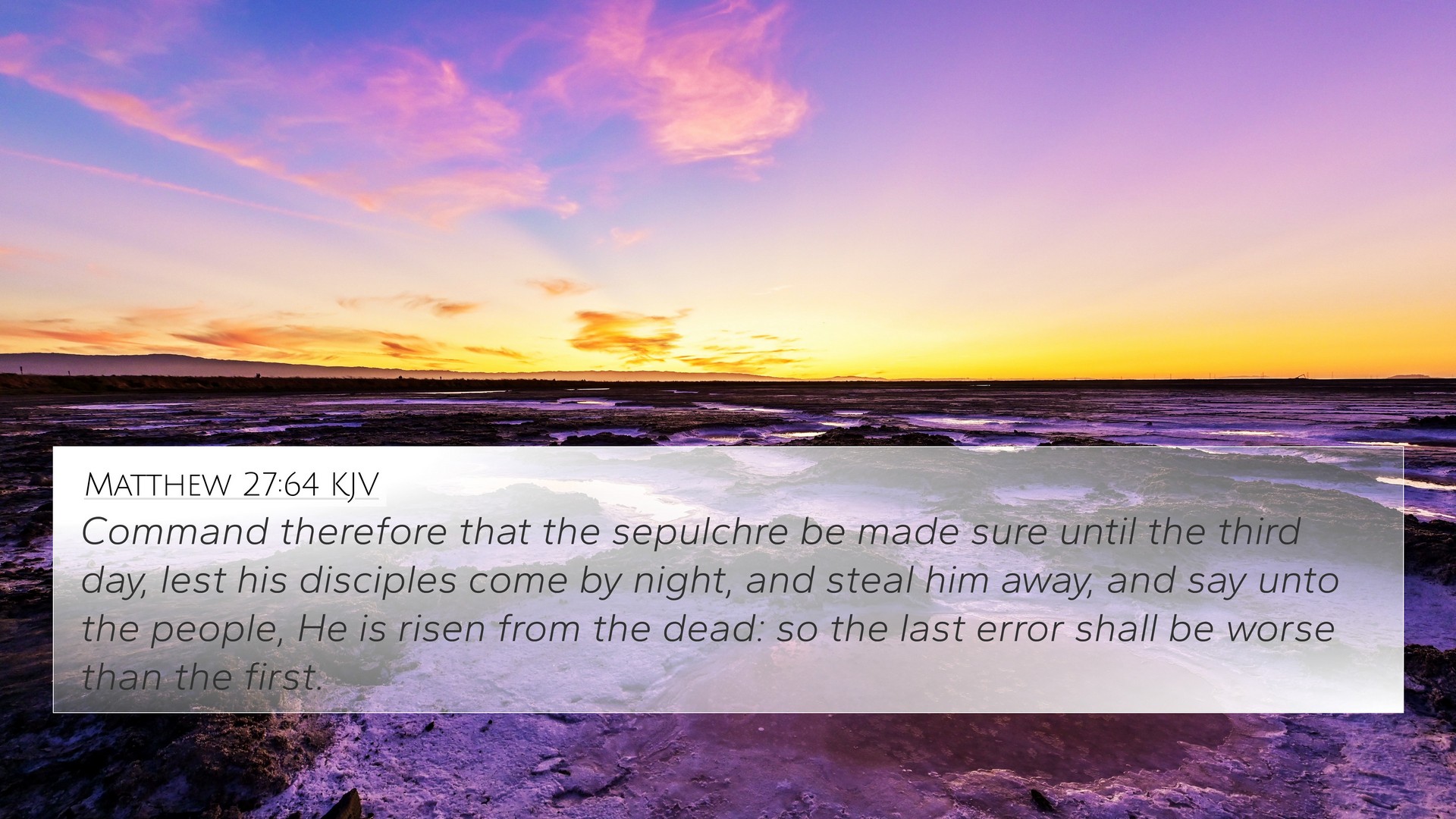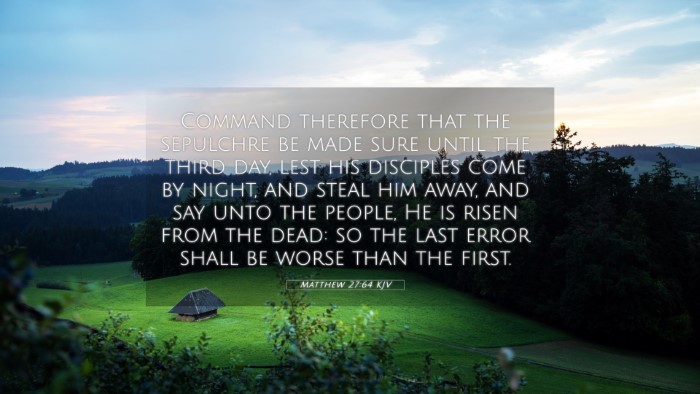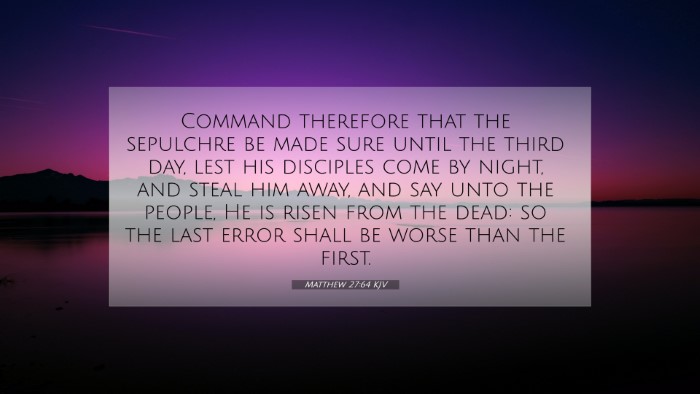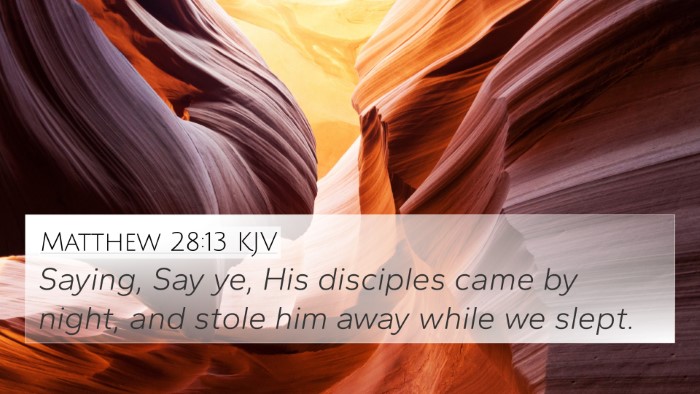Understanding Matthew 27:64
Matthew 27:64 states: "Therefore command that the tomb be made secure until the third day, lest His disciples come by night and steal Him away, and say to the people, 'He has risen from the dead.' So the last deception will be worse than the first."
Summary of the Verse
This verse occurs during the time following the crucifixion of Jesus, illustrating the concerns of the chief priests and Pharisees regarding the resurrection claims of Jesus. They fear that the disciples will deceive the people by claiming Jesus has risen if His tomb is left unguarded. They request that the tomb be secured to prevent this potential fraud.
Meaning and Insights from Commentaries
-
Matthew Henry:
Henry emphasizes that the religious leaders were very pragmatic yet hypocritical. They understood Jesus's prophecy about His resurrection and took active steps to prevent it, revealing their disbelief and fear of losing influence over the people.
-
Albert Barnes:
Barnes notes the irony that those who were supposed to be religious leaders were the ones orchestrating measures against the truth of Jesus’s resurrection. Their actions highlight the fear of personal loss and the need for control over the narrative of Jesus as a purported messianic figure.
-
Adam Clarke:
Clarke's commentary elucidates the extent of the Sanhedrin's commitment to suppress any claims regarding Jesus's resurrection. He indicates that their actions reflect the broader theme of the conflict between worldly authority and divine truth, a recurring motif throughout the Gospels.
Thematic Connections
This verse interlinks with several major biblical themes, including:
- Fear of Deception: The leaders feared that the resurrection narrative would fool the people. This irrational fear stands in contrast to the faith others would demonstrate in the resurrection.
- Conflict between Belief and Authority: The verse highlights a pivotal moment where the fear of authority clashes with the truth of the Gospel message, foreshadowing the larger struggle throughout the New Testament.
- The Resurrection: This verse allegorically points to the importance of the resurrection in Christian theology, and how it was anticipated and subsequently contested.
Cross-References
Matthew 27:64 can be examined alongside other biblical verses that echo similar themes or events:
- Matthew 16:21: "From that time Jesus began to show His disciples that He must go to Jerusalem, and suffer many things from the elders and chief priests and scribes, and be killed, and be raised the third day."
- Matthew 20:19: "And deliver Him to the Gentiles to mock and to scourge and to crucify. And the third day He will rise again."
- Luke 24:6-7: "He is not here, but is risen! Remember how He spoke to you when He was still in Galilee, saying, 'The Son of Man must be delivered into the hands of sinful men, and be crucified, and the third day rise again.'"
- John 2:19-21: "Jesus answered and said to them, 'Destroy this temple, and in three days I will raise it up.' But He was speaking of the temple of His body."
- Acts 2:24: "Whom God raised up, having loosed the pains of death, because it was not possible that He should be held by it."
- Mark 16:6: "But he said to them, 'Do not be alarmed. You seek Jesus of Nazareth, who was crucified. He is risen! He is not here. See the place where they laid Him.'
- 1 Corinthians 15:14: "And if Christ is not risen, then our preaching is vain and your faith is also vain."
Conclusion
Through this exploration of Matthew 27:64, we gain a deeper understanding of the anxiety surrounding Jesus’s resurrection. The juxtaposition of human authority against divine promise underscores a central conflict in the biblical narrative. Furthermore, engaging with related scripture allows for a richer context that shapes our comprehension of theological concepts such as resurrection and faith.
Utilizing Cross-References
For those searching to develop a cohesive understanding of biblical narratives, cross-referencing is an invaluable tool. By examining how various passages relate, one can uncover profound insights and thematic consistencies throughout Scripture.
SEO Keywords Summary
This analysis serves as a comprehensive resource on Bible verse cross-references, illuminating the connections between Bible verses and offering a foundation for anyone engaging in Bible cross-reference study.




